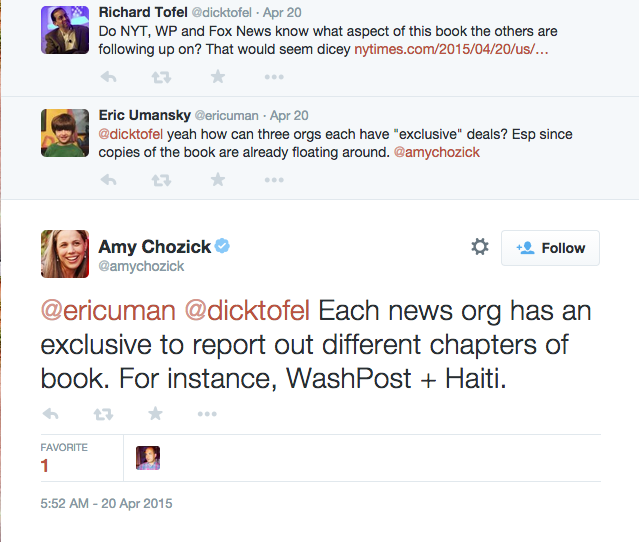April 24, 2015
New York Times Public Editor responds to questions about the paper’s “exclusive” deal with book author
by Julia Fleischaker

The vague descriptions of an exclusive agreement with an author left some Times readers confused and concerned. This twitter exchange probably didn’t help.
Earlier this week, we took a look at an “exclusive” agreement that Fox News, The Washington Post, and the New York Times had entered into with Peter Schweizer, the author of Clinton Cash, to be published by HarperCollins on May 5. A story in the Times described the outlets as having “exclusive agreements with the author to pursue the story lines found in the book.” We noted that this was an unusual setup, and that details of the agreement were scant. We had questions.
There should be no problem in using someone else’s research as a jumping off point, but I’m not entirely clear on how one enforces the exclusivity of an investigation. It’s also not clear what other terms are contained in the exclusive agreements. But does just the fact of the partnership taint any future reporting that stems from the book?
We weren’t the only ones with questions, and Margaret Sullivan, the Times‘ Public Editor addressed them today. Sullivan notes that she’s heard from more than 70 readers, and while some objected to the extreme partisan nature of the book’s author, most of the questions involved the terms of the deal itself.
One of those who wrote was the author James Gleick, who said that “at the risk of stating the obvious,” he had a few questions:
- A deal implies that the Times got something and the Times gave something. Surely it should be transparent about the quid and the quo. Is money involved? Promises of play? What?
- This standard and notorious formula — a copy of which was obtained by The New York Times — is immediately undermined. Is the reader supposed to think that the Times, having made an “exclusive agreement” with the author, didn’t get the book from the author?
- Likewise this one: Mr. Schweizer and a spokeswoman for HarperCollins, which is owned by News Corporation and is publishing the book, declined to comment. How can he have declined to comment, in the course of making the exclusive arrangement?
- What’s “exclusive” about the arrangement? It’s obviously not exclusive if it includes the Washington Post and Fox.
- Why does the Times need to make any arrangement with the author to “pursue story lines”?
According to Matt Purdy, one of the editors involved in making the arrangement, there was no financial component to the deal. As for what “storylines” the paper would be allowed to pursue, he told Sullivan that they “told the author that we wanted to do a story building on a chapter in his book that grew out of work we did in 2008. But we said there could be no conditions on what we wrote or when we published, and he agreed.” So, contrary to what the word “exclusive” could imply, Purdy told Sullivan that there were no limits on what his paper could choose to pursue.
For her part, Sullivan is convinced that nothing shady is going on, but is not thrilled with the ambiguity of the original language.
However, the description of the “exclusive” agreements, and the suggestion it contains that The Times made a deal to stay away from certain story lines is troubling. Mr. Purdy told me that The Times only had interest, at this point, in one portion of the book. This was not a situation, he said, of news organizations and a book publisher sitting in a room and carving up a pie, with a piece for each and no snacking off each other’s plates. But the language certainly seemed to suggest that, as did some chatter on Twitter.
And, as Eric Umansky of Pro Publica noted, also on Twitter: “How can three orgs each have ‘exclusive’ deals? Esp since copies of the book are already floating around.” In fact, Ms. Chozick herself, independent of The Times’s deal with the publisher, obtained a copy of the book, as was both suggested in her article and made clear in her tweets. That’s awkward and confusing, at best.
The Times should have been much more clear with readers about the nature of this arrangement.
Julia Fleischaker is the director of marketing and publicity at Melville House.